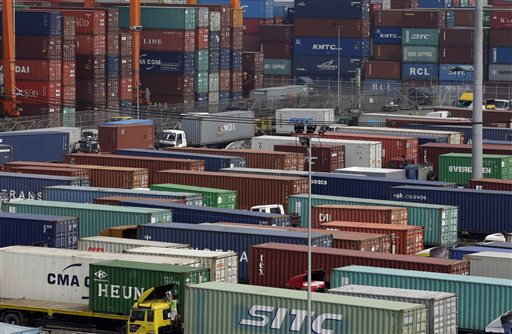Truck ban threatens PH competitiveness

Truck haulers wait for their turn to haul their cargo amid containers which are stacked five-tier high at the congested Manila International Container Terminal port on Aug. 20, 2014, in Manila. Manila has been dealing with heavy traffic for the past two months following the Manila city ordinance banning trucks from major thoroughfares and slowing down trucks in hauling containers. The truck ban and the resulting congestion at major ports pose new barriers to trade that could drag down the Philippines’ overall competitive score, according to officials. AP PHOTO/BULLIT MARQUEZ
MANILA, Philippines–Intensified focus will be key for policymakers if they are to protect the progress the country has made in global competitiveness—gains that are now harder to protect and improve.
The country continues to deal with several roadblocks, chief of them Manila’s truck ban and the resulting congestion at major ports, which officials said were new barriers to trade that could drag down the Philippines’ overall score.
“Recent negative developments in transportation and energy supply may adversely affect our rankings moving forward,” Makati Business Club (MBC) executive director Peter Perfecto told reporters on Wednesday.
Speaking at the presentation of the results of the World Economic Forum’s (WEF) latest Global Competitiveness Report, Perfecto took note of several weaknesses that threatened to undermine reforms of the past four years.
MBC is WEF’s partner in the Philippines in administering the surveys needed for the Global Competitiveness report.
In the 2014-2015 rankings, the Philippines jumped seven spots to 52nd out of 144 countries in terms of competitiveness, which takes into account a wide range of factors such as the state of infrastructure, the size of the local consumer market, the ease of doing business and resilience of the economy.
Since 2010, the country has jumped a total of 33 spots, making it the most-improved economy in the world, WEF data showed. The Philippines is now better-ranked than major emerging markets such as Brazil, India, Russia and South Africa.
Among Southeast Asia’s nine members (no data was available for Brunei) included in the survey, the Philippines now ranks fifth, behind Singapore (2nd), Malaysia (20th), Thailand (31st) and Indonesia (34th). The global rankings were topped by Switzerland. The United States came in third, while Finland and Germany were fourth and fifth, respectively.
The Philippines now finds itself in the top 36 percent of global rankings, just three percentage points away from its goal of being in the top 33 percent. “(This places us) on track to reaching our goal of being in the top third of economies by 2016,” Perfecto said.
Perfecto said that with the Philippines’ better ratings, climbing further would be more difficult. The risk of sliding back is also greater, given the higher quality of competition.
Former economic planning secretary Cielito Habito said the government should focus on boosting the manufacturing sector further to create more jobs that would make the economy more resilient.
He also called for a legislated competition policy, which, he claimed had been “blocked by forces in the economy. “He said this would fight monopolistic and oligopolistic tendencies of big businesses that make it harder for smaller firms to break into markets.














